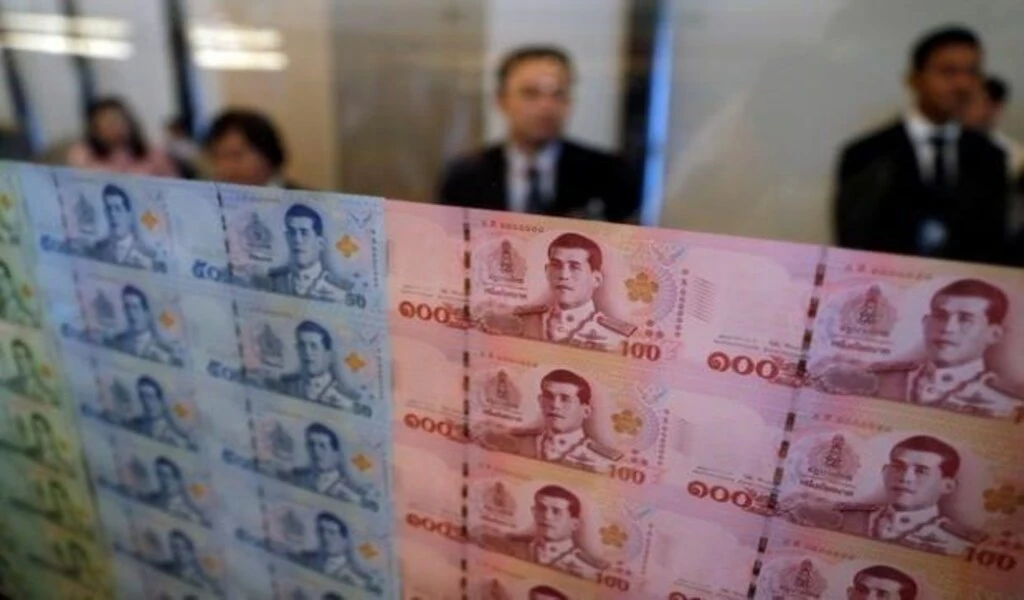Thailand’s baht is projected to decline further after slipping below 36 to the US dollar on Tuesday, when the Bank of Japan decided to raise interest rates for the first time in 17 years, which failed to boost Asian currencies.
According to Kasikorn Research Center (K-Research), the market anticipates the Federal Reserve to keep US interest rates steady on Thursday, potentially strengthening the dollar.
The Thai baht was quoted at 36.07 to the US dollar Tuesday afternoon, after falling to a two-week low of 36.04 in early morning trade and closing Monday at 35.98, according to Kanjana Chockpisansin, head of the think tank’s research, banking, and financial sectors.
K-Research now believes the baht will trade at 36.20-30 per dollar later this week, according to the Bangkok Post.
The yen fell below 150 to the dollar on Tuesday after the Bank of Japan hiked its benchmark interest rate from -0.1% to a range of 0%-0.1%, the first increase since 2007, following Japan’s largest corporations’ agreement last Friday to raise wages by 5.28% in 2024.
With the hike, there are no countries with negative interest rates.
The central bank also abandoned its aggressive yield curve control policy for Japanese government bonds and stopped buying high-risk assets like exchange-traded funds. However, the regulator stated that it will continue to buy long-term government bonds.
“The Bank of Japan’s decision on rates is quite minimal and the market expected this kind of move, so it failed to improve the sentiment for other Asian countries,” Ms. Kanjana added. “No additional measures are likely to be launched by the bank at its next meeting late next month.”
According to K-Research, the Fed is projected to hold interest rates unchanged on Thursday, potentially pushing the dollar higher against Asian currencies.
“The market expects the Fed will delay the first rate cut of the year from June to the second half, with less than three reductions this year,” she went on to say.
“The baht could trade at around 36.30 to the dollar by the end of the week, but if the Fed upgrades the US economic growth forecast, hinting rate cuts may be delayed further, then the dollar could strengthen and pressure a deeper baht slide.”
Thailand’s revenue collection falls short of target
According to permanent finance secretary Lavaron Sangsnit, government revenue collection has fallen short of expectations, indicating an economic slowdown caused mostly by reduced purchasing power due to high interest rates.
According to Mr Lavaron, higher borrowing rates have had an impact on people’s purchasing power, particularly those trying to buy vehicles or homes. While demand exists, people’s ability to make monthly loan payments has dwindled due to high interest rates, he explained.
This resulted in several loan rejections from banking institutions, he claimed.
According to Mr Lavaron, the drop in car and property transfers lowered government tax revenue.
He stated that lowering interest rates would help to shore up the struggling economy while also sending a clear signal of government support.
If the economy continues to deteriorate, additional financial resources will be required to resuscitate it, he stated.
Concerned about capital outflows as a result of interest rate cuts, he stated that this should not be a reason for alarm, noting that if capital did flow out, it would have done so before given the historical policy rate discrepancies between Thailand and the US.
Concerned that decreasing interest rates would worsen domestic inflation, Mr Lavaron stated that there are no symptoms of inflation here. He also noted that lowering interest rates today would not necessarily have an immediate impact on the economy, as its consequences could take more than six months to manifest.
The Fiscal Policy Office (FPO) recently announced that state revenue collection in the first four months of fiscal 2024 fell short of expectations, owing to a large reduction in oil taxes.
The government earned net revenue of 824 billion baht in the first four months of fiscal 2024 (October 2023 to January 2024), 8.84 billion baht or 1.1% less than expected.
The lower amount than planned was due to a reduction in diesel and gasoline tax rates during that time. Annually, the state’s net revenue in the first four months of the fiscal year declined by 14.9 billion baht, or 1.8%, from the previous year.
According to the FPO, an increase in special government income of 36.6 billion baht during the previous fiscal year resulted in an elevated baseline. Revenue collection in the first four months of current fiscal year increased by 2.7% year on year, excluding special income.
Thailand Sentences Temple Monk to 468 Years in Prison for Embezzlement
Thailand Sentences Temple Monk to 468 Years in Prison for Embezzlement






